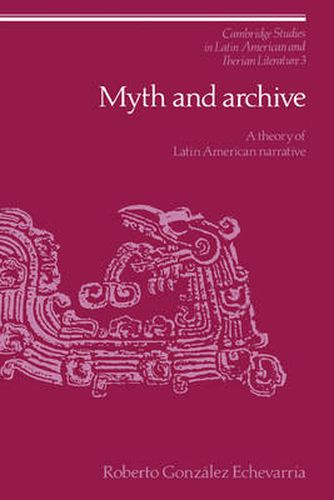Readings Newsletter
Become a Readings Member to make your shopping experience even easier.
Sign in or sign up for free!
You’re not far away from qualifying for FREE standard shipping within Australia
You’ve qualified for FREE standard shipping within Australia
The cart is loading…






This book offers a new theory about the origin and evolution of the Latin American narrative, and about the emergence of the modern novel. It argues that the novel developed from the discourse of the law in the Spanish Empire during the sixteenth century, while many of the early historical documents concerning the New World assumed the same forms, furnished by the notarial arts. Thus, both the novel and these first Latin American narratives imitated the language of authority. The book explores how the same process is repeated in two key moments in the history of the Latin American narrative. In the nineteenth century, the model was the discourse of scientific travellers such as von Humboldt and Darwin, while in the twentieth century, the discourse of anthropology - the study of language and myth - has come to shape the narrative. Professor Gonzalez Echevarria’s theoretical approach is drawn from a reading of Carpentier’s Los pasos perdidos, and the book centres on major figures in the tradition such as Columbus, Garcilaso el Inca, Sarmiento, Gallegos, Borges and Garcia Marquez.
$9.00 standard shipping within Australia
FREE standard shipping within Australia for orders over $100.00
Express & International shipping calculated at checkout
This book offers a new theory about the origin and evolution of the Latin American narrative, and about the emergence of the modern novel. It argues that the novel developed from the discourse of the law in the Spanish Empire during the sixteenth century, while many of the early historical documents concerning the New World assumed the same forms, furnished by the notarial arts. Thus, both the novel and these first Latin American narratives imitated the language of authority. The book explores how the same process is repeated in two key moments in the history of the Latin American narrative. In the nineteenth century, the model was the discourse of scientific travellers such as von Humboldt and Darwin, while in the twentieth century, the discourse of anthropology - the study of language and myth - has come to shape the narrative. Professor Gonzalez Echevarria’s theoretical approach is drawn from a reading of Carpentier’s Los pasos perdidos, and the book centres on major figures in the tradition such as Columbus, Garcilaso el Inca, Sarmiento, Gallegos, Borges and Garcia Marquez.